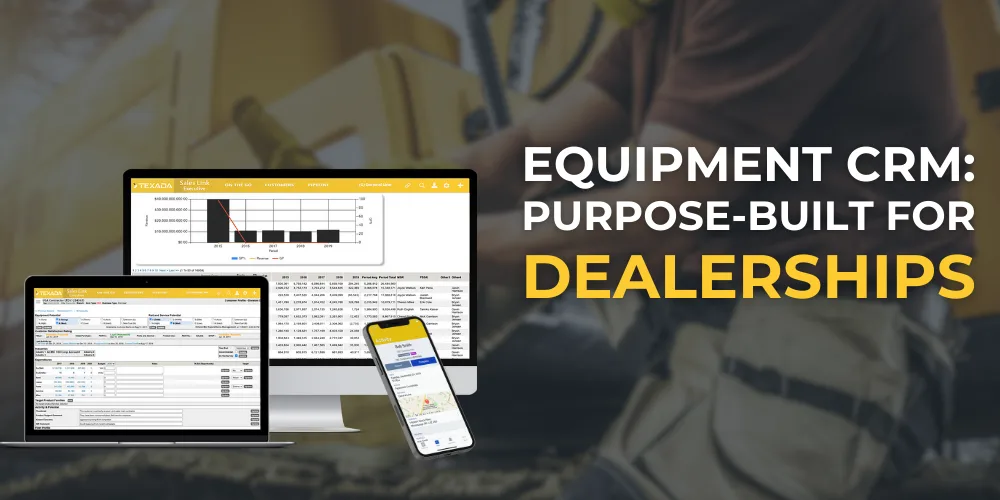Managing an equipment dealership can be challenging. You have to keep track of inventory, maintain customer relationships, handle sales, and ensure timely service. That is where a heavy equipment dealer management system (DMS) comes in. Think of it as a powerful tool that combines all these tasks in one easy-to-use system. With DMS, you can monitor your inventory in real-time and provide excellent customer service.
DMS also streamlines the sales process, helping you convert leads into customers faster. It tracks maintenance schedules and inventory, ensuring your equipment is always in top condition. Financial management has become simpler, too, with features for invoicing, expense tracking, and detailed reporting.
In this article, we will explore how DMS can transform the operations of equipment dealership businesses. You’ll learn about the key features and benefits of DMS and see how businesses can thrive using this technology. Whether you want to improve inventory management, enhance customer satisfaction, boost sales, or optimize service operations, DMS can significantly impact your business. Let’s dive into how dealer management software can revolutionize your dealership operations.
Understanding Heavy Equipment Dealer Management Systems
Heavy equipment dealer management system is a powerful tool designed to help equipment dealership businesses manage their operations efficiently. It integrates various tasks like inventory tracking, sales management, customer relationship management, and service scheduling into one system. With DMS, you can easily monitor your equipment inventory in real-time, ensuring you always know what you have in stock and when you need to reorder.
DMS streamlines the sales process, from generating leads to closing deals, and offers valuable insights through detailed reports and analytics. So, DMS is like the central hub for all your dealership needs, helping you run your operations smoothly and efficiently.
Types of Heavy Equipment Dealer Management Systems
When it comes to heavy equipment dealer management systems, there are a few different types to choose from, each designed to meet the specific needs of your dealership business.
On-Premises DMS
This type of software is installed directly on your company’s servers and computers. You have full control over the system and your data, but it requires a significant upfront investment in hardware and IT support. It’s a good choice for larger businesses with dedicated IT teams.
Cloud-Based DMS
This software is hosted online, meaning you can access it from anywhere with an internet connection. Cloud-based DMS is usually offered as a subscription service, which can be more affordable upfront. It’s easy to update and scale as your business grows, making it ideal for smaller or medium-sized dealerships that want flexibility without the need for extensive IT infrastructure.
Specialized DMS
Some DMS solutions are tailored for specific types of equipment or industries. For example, there are DMS options designed specifically for construction equipment, agricultural machinery, or heavy trucks. These specialized systems often include features that address the unique needs of your particular market.
Integrated DMS
These systems are designed to work seamlessly with other software you might already be using, such as accounting programs, CRM tools, or ERP systems. Integrated DMS helps ensure all your business operations are connected, providing a more streamlined workflow.
Choosing the right type of DMS depends on your business size, budget, and specific needs. Each type has its advantages, so it’s important to consider what will work best for your dealership business.
Common Challenges Solved with Heavy Equipment Dealer Management Solutions
Running an equipment dealership business comes with many challenges. From managing customer relationships to keeping track of inventory, maintaining equipment, handling sales, and managing finances, each task requires attention and efficiency. Let’s take a closer look at some common challenges in these areas.
Customer Relationship Management
One of the biggest challenges is keeping customers happy, satisfied, and loyal. You must manage customer information, track interactions, and ensure timely follow-ups. Providing excellent service becomes difficult if customer details are scattered across different systems or not updated regularly. Happy customers are key to repeat business and referrals, so having a streamlined process for managing relationships is crucial.
Inventory Management
It could be complicated to keep track of your inventory. You need to know what equipment you have, what needs to be ordered, and what’s already sold. Without accurate and real-time information about your inventory’s availability and condition you risk overstocking, which ties up capital, and understocking, which leads to missed sales and incidents like theft and damage. Balancing inventory levels and ensuring you have the right equipment available when needed is a constant struggle.
Sales Operation Management
Managing sales operations involves many steps, from generating leads to closing deals and managing contracts. Each step requires coordination and accuracy. Without a streamlined process, it’s easy for opportunities to slip through the cracks. You need a system that helps track leads, manage contracts, and provide insights into sales performance. Additionally, businesses need to track equipment availability and ensure that equipment is available on time and in good condition.
Financial Management
Handling finances in an equipment dealership business can be complex. You need to manage invoicing, track expenses, and generate accurate financial reports. Without proper financial management, it’s hard to understand your business’s financial health and make informed decisions. Ensuring timely and accurate billing, managing expenses, and having a clear picture of profitability are all critical aspects of financial management.
The Role of Heavy Equipment Dealer Management in Inventory Management
The heavy equipment dealer management system plays a crucial role in inventory management by tracking stock levels in real-time and automating reorder processes, ensuring businesses maintain optimal inventory levels and reduce stockouts.
Equipment Tracking and Real-Time Monitoring
DMS helps track inventory levels in real-time, providing accurate information about what equipment is in stock or needs reordering. This visibility ensures optimal inventory levels, preventing both overstocking and understocking. Real-time tracking also helps in making informed purchasing decisions and improving overall inventory efficiency.
Automation of Tasks and Operations
Beyond tracking and monitoring, heavy equipment dealer management systems excel in automating various inventory management tasks and operations. Automation is a significant advantage as it reduces the manual workload, minimizes errors, and enhances operational efficiency. For instance, DMS can automatically generate purchase orders when inventory levels drop below a predefined threshold. This proactive approach ensures you always have essential items on hand without constant manual intervention.
How a Heavy Equipment Dealer Management System Helps With Customer Relationship Management
A heavy equipment dealer management system improves customer relationship management by organizing customer data centrally, facilitating efficient communication, and enhancing customer satisfaction and loyalty.
Management of Customer Data
A heavy equipment dealer management system enhances customer relationship management by centralizing and organizing customer data. Instead of scattering information across spreadsheets or different systems, DMS stores all customer details in one place. It includes contact information, purchase history, service records, and specific preferences or interactions. With easy access to comprehensive customer profiles, your team can provide personalized service, anticipate needs, and foster stronger relationships.
Management of Client Communication
DMS facilitates effective client communication through integrated tools. It tracks all customer interactions, including emails, calls, meetings, and service requests. It ensures every communication is logged and easily accessible, helping your team stay informed and responsive. Automated reminders and follow-ups can be set up to ensure timely responses and proactive engagement with customers. Moreover, DMS often includes features for running targeted marketing campaigns, sending personalized messages, and tracking campaign effectiveness. This capability improves customer satisfaction, enhances customer retention, and drives business growth by nurturing ongoing relationships.
Improved Customer Experience and Satisfaction
DMS enhances the overall customer experience by centralizing customer data and facilitating effective communication. Timely responses to inquiries, personalized service based on historical interactions, and proactive outreach contribute to improved customer satisfaction. Customers appreciate the efficiency and personalization that DMS enables, leading to stronger relationships and increased loyalty.
Managing Sales Operations with a Heavy Equipment Dealer Management System
Sales Operation Management
DMS optimizes sales operations for equipment dealerships. It facilitates the entire sales process, from lead generation to closing deals. DMS captures leads through integrated CRM functionalities, tracks prospect interactions, and manages sales pipelines efficiently. It allows sales teams to prioritize leads, follow up effectively, and convert opportunities into sales.
Furthermore, DMS provides visibility into sales performance through detailed analytics and reporting. Sales managers can analyze metrics such as conversion rates, sales trends, and revenue generated per salesperson. These insights enable informed decision-making and strategic planning to drive sales growth.
Analytics and Reporting
Analytics and reporting are integral components of DMS that provide valuable insights into sales operations. DMS generates comprehensive reports on equipment availability, sales performance, customer acquisition costs, and more. These reports help businesses identify trends, evaluate performance against goals, and uncover areas for improvement.
By leveraging data-driven insights, equipment dealerships can make informed decisions to enhance operational efficiency, improve customer satisfaction, and, ultimately, achieve business success.
Financial Management and ROI Enhancement with Heavy Equipment Dealer Management System
DMS can enhance your equipment dealership’s financial health and maximize return on investment. It can streamline invoicing, payment management, and financial analytics to boost efficiency and profitability effortlessly. Let us find out how DMS contributes to streamlining payments and boosting the bottom line.
Invoicing and Payment Management
A heavy equipment dealer management system streamlines financial processes, particularly invoicing and payment management, for equipment dealership businesses. DMS automates invoicing by generating and sending invoices automatically based on sales transactions. It reduces manual errors, speeds up the invoicing cycle, and ensures accurate billing.
Moreover, DMS facilitates payment management by tracking payments received and outstanding. It sends automated reminders for overdue payments, helping businesses maintain healthy cash flow. Integration with payment gateways enables secure online payments, enhancing convenience for customers and improving overall efficiency.
Performance Optimization for ROI Enhancement
DMS enhances ROI through performance optimization across various business operations. By providing detailed analytics and reporting capabilities, DMS offers insights into financial performance, sales trends, inventory turnover, and operational efficiency. Businesses can identify underperforming areas, optimize resources, and make data-driven decisions to maximize profitability.
Furthermore, DMS enables cost control and expense management by tracking expenses, monitoring budget adherence, and generating financial reports. This visibility into financial metrics allows businesses to implement cost-saving measures and allocate resources effectively.
Scalability and Integration Capabilities Offered by Heavy Equipment Dealer Management System
Explore how a heavy equipment dealer management system enhances business flexibility and efficiency through robust scalability and seamless integration capabilities. It adapts and expands your operations effortlessly while integrating critical systems for streamlined management and enhanced performance.
Long-Term Scalability and Adaptability
DMS provides equipment dealerships with long-term scalability and adaptability. As businesses grow, DMS scales effortlessly to accommodate increasing operational needs and expanding inventory. It supports managing larger fleets of equipment and handling a growing customer base without compromising performance.
Moreover, DMS offers flexibility to adapt to evolving industry trends and technological advancements. It continuously updates features and integrates new functionalities to meet changing business requirements and regulatory standards. This adaptability ensures that businesses remain competitive and agile in a dynamic market environment.
Integration With Other Critical Systems
Integration with other critical systems is a key strength of DMS, enhancing overall operational efficiency and data accuracy. DMS seamlessly integrates with ERP systems, CRM software, and third-party applications such as accounting software and marketing tools.
By integrating these systems, DMS facilitates smooth data flow and synchronization across different departments. For instance, integration with ERP systems enables real-time updates of financial data and inventory levels. CRM integration ensures centralized customer information, enhancing customer service and marketing efforts. Additionally, integration with accounting software automates financial transactions and reporting, streamlining financial management processes.
Texada Software, The Ultimate Dealer Management System For Heavy Equipment Businesses
Texada is the ultimate heavy equipment dealer management system tailored specifically for equipment businesses. With its comprehensive suite of tools and features, Texada empowers businesses to efficiently manage their inventory, and streamline asset tracking and maintenance. Its user-friendly interface and high-end integration capabilities make Texada the preferred choice for heavy equipment businesses looking to enhance operational efficiency, maximize productivity, and achieve greater profitability in a competitive market.
Modern Heavy Equipment Dealer Management
Discover the standout qualities that make Texada the ideal dealer management system for heavy equipment businesses. Explore how Texada’s features and capabilities cater specifically to the unique needs of the heavy equipment industry, enhancing operational efficiency and driving business success.
Comprehensive Inventory Management
Texada excels in managing extensive inventories of heavy equipment. It provides robust features for tracking equipment availability and optimizing utilization rates. It ensures that businesses can maximize the efficiency of their equipment fleets and reduce downtime.
Advanced Asset Tracking and Maintenance
Texada’s advanced asset tracking capabilities enable businesses to monitor equipment in real-time, track usage patterns, and predict maintenance needs. This proactive approach helps reduce maintenance costs, extend equipment life, and ensure compliance with safety and regulatory standards.
Integration with Business Systems
Texada integrates seamlessly with various business systems, including ERP and CRM solutions. This integration enhances data flow across departments, improves decision-making with real-time insights, and streamlines financial management processes such as invoicing, payments, and reporting.
User-Friendly Interface and Support
Texada has a user-friendly interface that simplifies navigation and enhances usability for all staff levels. It offers comprehensive training and support resources to ensure that businesses can fully leverage its features and maximize their operational efficiency.
With years of experience serving heavy equipment businesses, Texada understands the industry’s unique challenges and requirements. It continuously evolves its features and functionalities to meet its customers’ changing needs and stay ahead in a competitive market.
Texada stands out as the most competent and reliable heavy equipment dealer management system for equipment businesses due to its comprehensive inventory management, advanced asset tracking capabilities, seamless integration with business systems, user-friendly interface, and industry-specific expertise. Businesses can optimize their operations, improve productivity, and achieve greater profitability in the heavy equipment industry by choosing Texada.
Get in touch with our representatives to implement Texada’s dealer management excellence into your heavy equipment business.





